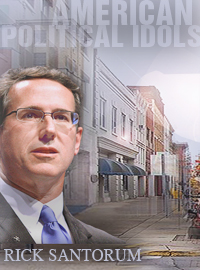| The Nation Could Use Santorum-omics |
 |
|
By Quin Hillyer
Tuesday, July 19 2011 |
Conservatives spend so much searching for the latest political version of American Idol, no matter how evanescent, that they somehow seem to miss real substance when it appears. That’s what might have happened a few weeks ago when former Sen. Rick Santorum, now running for president, released what could be the boldest and best economic-growth plan in years. The heart of Santorum’s plan involves corporate income tax rates. By now, it’s such common knowledge that U.S. corporate rates are the highest in the developed world that even Bill Clinton and Barack Obama have called for trimming them. Yet almost every proposal out there just nibbles at the edges, dropping the top marginal rate from 35 percent to either 30 or 25 percent – all while quietly trying to recoup the revenue through the back door, by allowing dividend and capital gains tax rates to rise back to high levels that prevailed before the Bush 2003 rate reductions. Santorum, to his credit, avoids such timidity. Instead, Santorum would lock in place the current, low cap-gains and dividend rates, while cutting corporate income-tax rates immediately in half. Better still, he would “repatriate taxable income outside the United States at a rate of 5% to induce job creation here in America rather than abroad” – and, boldest of all, he would completely eliminate corporate income taxes for all manufacturers. A more powerful set of job-producing measures could hardly be imagined. Right now, cash and cash equivalents on the balance sheets of big businesses are at an all-time high, and the S&P 500 index could rally nearly 50 percent before cash holdings dropped to their historical averages. If businesses know they can suddenly keep control of 17.5 percent more of their profits, or 35 percent more if they are manufacturers, a virtual ton of the corporate cash holdings could be unleashed and reinvested without harming the businesses’ nest eggs. The benefits to the overall economy could play out in numerous ways at once. Larger capital investments. Substantially more workers hired. Wage hikes. Price cuts for consumer products (because even at lower prices the businesses could achieve higher post-tax profits). Higher dividends for tens of millions of stockholders, including 401(k) owners and union pensioners alike. Larger capital gains as well. And a major boost to the stock market. Even under “static” scoring, most of those effects would bolster government revenues almost enough to make up for the lower rates. Under “dynamic” scoring, backed by the experience of every single major investment tax cut in the past 50 years, total government revenues could actually rise even as rates fall, thus helping cut deficits and debt. Indeed, if there ever were a time when corporate rates could be cut with little downside risk to revenues, it is now. At last measure, corporate income taxes were producing just $195 billion annually for the federal government (down from more than $300 billion four years ago) – not insubstantial money, of course, but comparative child’s play when Congress and the president are talking about trillions in savings. These also are tax cuts that blue-collar workers, including unionized ones, should easily support, because the cuts together would be that rare “pro-corporate” reform that also is overwhelmingly pro-labor. The Congressional Budget Office has noted that “domestic labor bears slightly more than 70 percent of the burden of the corporate income tax.” As wise as those corporate tax changes might be, Santorum’s growth plan doesn’t stop there. He calls for cutting and capping spending, making individual tax rates “simpler, flatter, and fairer,” rolling back regulatory burdens, streamlining the patent process, repealing the Sarbanes-Oxley and Dodd-Frank laws, and unleashing domestic energy exploration and development. From some candidates, these proposals might be pie-in-the-sky, but Santorum has a record of successful economic legislating as the lead sponsor of the justly celebrated 1996 reforms to the Aid to Families with Dependent Children welfare program. If conservatives really are interested in substance, Santorum’s proposals might boost him in the polls. Regardless, they would amount to wise, productive policy. |
Related Articles : |
























